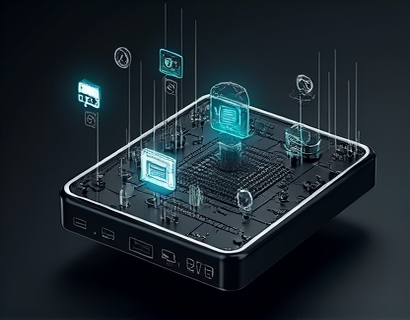Transforming Healthcare with AI-Powered Solutions: Instant Expert Insights and Personalized Medical Support Online
The integration of artificial intelligence in healthcare has ushered in a new era of medical innovation, offering patients instant access to personalized medical insights and expert advice. This transformation is not just about technology; it's about empowering individuals to take control of their health with informed decisions and enhanced well-being. An AI-driven platform stands at the forefront of this revolution, providing a seamless and reliable source of healthcare information and support.
Understanding AI in Healthcare
Artificial intelligence in healthcare, often referred to as Healthtech, encompasses a broad range of applications from predictive analytics to personalized medicine. AI algorithms can process vast amounts of medical data quickly, identifying patterns and insights that human practitioners might miss. This capability is crucial in delivering timely and accurate medical advice to patients.
One of the key advantages of AI in healthcare is its ability to offer personalized medical support. By analyzing a user's medical history, lifestyle, and current symptoms, AI can provide tailored recommendations and insights. This personalization is essential in modern healthcare, as it acknowledges the unique needs and circumstances of each individual.
Instant Access to Expert Insights
Imagine having access to expert medical advice at your fingertips, available 24/7. An AI-powered platform makes this a reality. Users can engage with the platform to receive instant expert insights on a wide range of health topics. Whether it's understanding a new symptom, seeking advice on treatment options, or getting guidance on preventive care, the platform provides reliable and up-to-date information.
The expertise embedded in these AI systems comes from extensive training on large datasets, including medical literature, clinical guidelines, and expert opinions. This ensures that the advice given is not only immediate but also grounded in the latest medical knowledge.
Personalized Medical Support
Personalization is a cornerstone of AI-driven healthcare. The platform uses advanced algorithms to analyze user data and provide customized health recommendations. This approach goes beyond generic advice, offering solutions that are specific to the user's health profile, lifestyle, and preferences.
For instance, a user with chronic conditions can receive tailored advice on managing their condition, including medication reminders, dietary suggestions, and exercise routines. This level of personalization helps users stay proactive in their health management, leading to better outcomes and improved quality of life.
Enhancing Informed Decision-Making
With the overwhelming amount of health information available online, it can be challenging for individuals to make informed decisions about their health. An AI-powered platform simplifies this process by providing evidence-based insights and expert advice. Users can explore various health topics, understand the pros and cons of different treatments, and make choices that align with their health goals.
The platform also helps demystify medical jargon, translating complex information into understandable terms. This empowers users to engage in meaningful discussions with their healthcare providers, leading to more collaborative and effective care.
Timely Support and Well-Being
Timeliness is critical in healthcare, especially in emergency situations or when managing chronic conditions. An AI-driven platform ensures that users receive prompt support whenever they need it. Whether it's a sudden health concern or ongoing management of a condition, the platform offers immediate assistance.
Moreover, the platform's focus on preventive care and wellness contributes to overall well-being. By providing personalized health tips, fitness recommendations, and nutritional advice, users can take proactive steps to maintain their health. This holistic approach not only addresses immediate health issues but also promotes long-term wellness.
Building Trust Through Reliability
Trust is paramount in healthcare, and an AI-powered platform must prioritize accuracy and reliability. The platform is designed with rigorous quality control measures to ensure that the information and advice provided are accurate and up-to-date. This includes regular updates to the underlying algorithms and datasets, as well as partnerships with medical experts to validate the content.
Transparency is also key. Users are informed about the sources of the information and the basis for the recommendations. This transparency builds trust and confidence in the platform, encouraging users to rely on it for their health needs.
User Experience and Accessibility
The success of an AI-driven healthcare platform hinges on its user experience. The platform is designed to be intuitive and user-friendly, ensuring that individuals of all technical backgrounds can navigate it with ease. Clear interfaces, simple navigation, and responsive design make the platform accessible on various devices, from smartphones to desktops.
Additionally, the platform is committed to inclusivity, supporting multiple languages and accommodating users with different abilities. This ensures that a wide range of individuals can benefit from the platform's services, regardless of their background or technical proficiency.
Integration with Existing Healthcare Systems
To maximize its impact, the AI-driven platform is designed to integrate seamlessly with existing healthcare systems. This includes compatibility with electronic health records (EHRs), telemedicine platforms, and other healthcare technologies. Such integration allows for a more cohesive and efficient healthcare experience, where information is shared seamlessly between different stakeholders.
For healthcare providers, the platform can serve as a valuable tool for monitoring patient health, providing additional insights, and supporting clinical decisions. This collaboration between AI and human expertise enhances the overall quality of care.
Addressing Privacy and Security Concerns
Privacy and security are critical concerns in healthcare, and an AI-powered platform must adhere to the highest standards to protect user data. The platform employs robust encryption methods, secure data storage, and strict access controls to ensure that sensitive information is safeguarded.
Compliance with regulations such as the General Data Protection Regulation (GDPR) and the Health Insurance Portability and Accountability Act (HIPAA) is also a priority. By prioritizing data security, the platform builds trust and ensures that users can confidently share their health information.
Future Prospects and Innovations
The potential for AI in healthcare is vast, with ongoing research and development paving the way for even more advanced applications. Future innovations may include more sophisticated predictive analytics, enhanced virtual health assistants, and integration with wearable devices for real-time health monitoring.
As AI technology continues to evolve, the platform will adapt to incorporate these advancements, further enhancing its capabilities and the value it provides to users. The goal is to stay at the forefront of medical innovation, continuously improving and expanding the range of services offered.
Conclusion
The integration of AI in healthcare represents a significant leap forward in providing personalized, timely, and reliable medical support. An AI-driven platform offers users the power of expert insights and personalized care at their fingertips, transforming the way individuals manage their health. By leveraging advanced technology, we can empower people to make informed decisions, leading to better health outcomes and a higher quality of life.










































